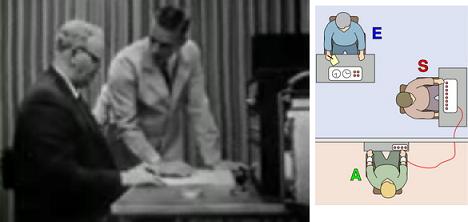May 7, 2008
First Person Account Of The Milgram Experiment

An article written by one of the test subjects in the Milgram experiments, and his explanation for why it happened the way it did.
He's wrong.
First, if you do not know the experiment (video): a "learner" would be strapped to a chair in the next room-- so they could be heard, but not seen-- and would be asked to remember words from a pair. If he got it wrong, the professor would tell the tester to operate a machine that would remotely administer electric shocks.
In reality, the thing was staged; it was really an experiment to see if the tester would submit to authority: "please continue administering the shocks."
Most "testers" continued to shock as long as the professor told them to, even though they could hear the learner howling in horrible pain. Perhaps they thought the scientist had some safeguards from actual death, who knows. But the results show that people are sheep given the right power structure.
This article is by one who refused to continue giving shocks. His reasons for stopping are interesting:
In retrospect, I believe that my upbringing in a socialist-oriented family steeped in a class struggle view of society taught me that authorities would often have a different view of right and wrong than mine.He goes on to detail the origins of a default suspiciousness of authority:
Like all soldiers [in WWII], I was taught to obey orders, but whenever we heard lectures on army regulations, what stayed with me was that we were also told that soldiers had a right to refuse illegal orders (though what constituted illegal was left vague).and his battles with the government:
In the early 1950s, I [the Chairman of the New Haven Communist Party] was harassed and tailed by the FBI, and in 1954, along with other leaders of the Communist Party in Connecticut, I was arrested and tried under the Smith Act on charges of "conspiracy to teach and advocate the overthrow of the government by force and violence." ... I believe these experiences also enabled me to stand up to an authoritative "professor."
I have a personal bias against communism, so I'm skeptical of this answer. By invoking communism/socialism, he is implying that he has a higher sense of rightness than others might, and some attachment to the common man that made him not want to proceed with hurting the guy on the other end of the shocks. Before you read further, read his quotes again and see if you agree with my assessment.
But here's why he refused:
...[the professor] insisted that I continue [giving shocks.] I refused, offered to give him back the five dollars, and told him that I believed the experiment to be really about how far I would go, that the learner was an accomplice, and that I was determined not to continue.
He didn't stop because of moral courage; he stopped because he thought he was being played.
The distinction is extremely important. His life experiences didn't make him strong against against authority, but to be suspicious that authority is an authority. He stopped not because the other person was being shocked-- what he cared about was being manipulated.
And so again, narcissism, though in this case resulting in a "healthy" outcome because it heightened his perception of games and manipulation.
I'm not criticizing this man-- what he did in this experiment isn't generalizable to other circumstances precisely because he thought it wasn't real.
A more interesting question would be how much further he would have gone if he didn't think it was a trick; when would moral courage as opposed to indignation have taken over?
Let's be clear that there is a difference between not playing because you think it's rigged, and playing despite it being rigged, doing the best you can anyway, because that is what life is...
18 Comments